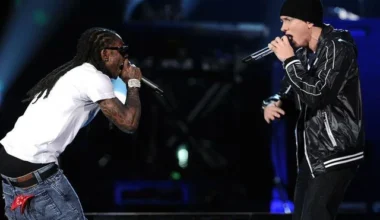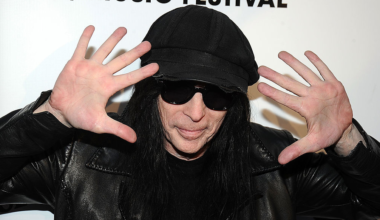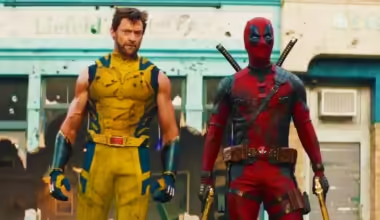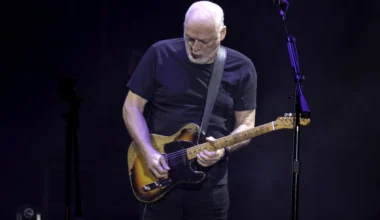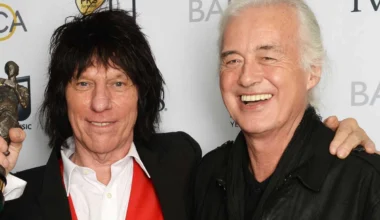Curtis Jackson has downsized. The rapper/actor/businessman, better known as 50 Cent, used to live in a palace of a house formerly owned by Mike Tyson. Not any more. He has been in self-isolation for six weeks and is more than happy to make do with a three-bed apartment (on four floors, mind) in New York. He can’t remember when he was last in one place for so long, he says, and is learning about himself. “I’ve become a bit more comfortable with being in my own space. I don’t think being at home is a punishment.”
He bought the Tyson house after his triumphant first album; Get Rich Or Die Tryin’ shifted 12m copies in 2003, making it the bestselling album of the year. It was explosive – growling rap packed with threats, boasts and great songs such as In Da Club and Many Men.
Get Rich was really his life story. And what a story. His drug-dealing mother, Sabrina, was murdered when he was eight (drugged and gassed at 23 by an unknown killer in her home); he started selling drugs on the streets at 12, bought his first gun at 15 and was shot nine times at the age of 25 (including a bullet through the cheek that gives him his distinctive slur today). He was dropped by Columbia without releasing a record, signed up by Eminem and championed by Dr Dre. And then came that monster first album. Jackson hasn’t repeated the success of his debut (although his second album, The Massacre, was also huge), but he has continued to hustle and find headline-grabbing ways of getting rich.
For Jackson, it begins and ends with the money, right down to the name, which he appropriated from a dead gangster. When he bought the Tyson house, he says, he had been struggling to pay his $800-a-month rent bill for the apartment he shared with his then-partner and his first son, Marquise. “Then I left for a tour of Get Rich Or Die Tryin’ and I came back with $38m [£30m]. So getting that place was confirmation of success.” But he got bored. “You may have 18 bedrooms, but you can only sleep on one bed. You have all that space, but you still can’t walk around the house naked, ’cause you’ve got staff. Going down the hall was like walking down the street.”
Jackson has just written a very readable book about how to do things his way. Hustle Harder, Hustle Smarter is classic Fiddy – a self-help guide for aspiring bigwigs. By turns, he comes across as machiavellian (tips include pretending to drink on a night out with colleagues then exploiting the weaknesses they have drunkenly revealed), cynical (women just want him for his money), puritanical (he doesn’t drink or take drugs), little-boy-lost (desperately seeking affirmation) and wise elder (telling readers of the need to constantly evolve to stay relevant). When he is not boasting, bullying or dissing, much of his advice is perfectly sensible – be true to yourself, don’t make the same mistake twice and dress decently if you want to make an impression.
I ask what he is wearing today. “I don’t even have all my clothes on yet.” That’s exciting, I say, tell me more. “I’m wearing an undershirt, like a white tank top, and black sweatpants.” Hold on, I say: in your book, you suggest not looking your best for somebody shows a lack of respect. I know we are only talking on the phone, but … “Yeah, ’cause I’m in quarantine in the house and that doesn’t apply to quarantine.” He laughs.
Has the pandemic affected him personally? “I know three or four people who have passed from my old neighbourhood in Queens. In New York City, Queens always becomes the worst place.” Why does he think that so many of the 63,000-plus people who have died in the US are from black and ethnic minority backgrounds? “I don’t think coronavirus is discriminating based on income. Hehehe!” He giggles. But if you don’t have money to self-isolate and have to go out to work to pay the bills, surely it leaves you more exposed to catching Covid-19? Jackson is not having any of it. “In my experience, you can’t force people to work.” But, he says, he sure is glad people in the service sector are still working. “If those people stayed home, it would have been hell. There would be no deliveries, no orders. You would have had to have stocked up already in your home.” I sense that Jackson would find it impossible to look at any situation without putting himself at the centre of it.
How does he feel Trump has dealt with the crisis?
A voice on the line interjects. It is Amanda, Jackson’s personal publicist. “We really need to bring it back to the book,” she says. But Jackson is happy to talk Trump. “It’s an awkward situation. If you respond too fast, you’re wrong, because everyone would be kicking and screaming and saying you shut everything down. But if you shut it down late, you’re wrong. So you can’t win in that situation.” He has sympathy for Trump? “People hate him or love him. There’s no in-between. And for me, I’m looking at it and going: ‘That’s the exact position I’m in.’”
Another thing he has in common with the president is his obsession with money. Jackson attributes his values to Sabrina, who taught him to hustle. “My decisions were pre-made for me. My mom having me at 15 was why we got into this lifestyle.” Selling drugs was more rewarding than any alternative for Sabrina. “She did well before she got stuck in that dangerous lifestyle,” he says.
After her death, he moved in with his grandparents. They had eight children of their own, no money to spare and laid down strict rules. He adored them, but they could provide none of the luxuries his mother had been able to. “The only people I saw coming round who had nice things were from my mom’s life. They had Cadillacs, expensive jewellery, everything that symbolised financial freedom.” When he started selling drugs, he told his grandparents he was at after-school club. He has remained wedded to his love of nice things ever since. “If you don’t want nice things in your life, I don’t even want to know you.” He pauses. “I. Don’t. Want. To. Know. You,” he repeats. Jackson can be staggeringly absolutist.
Yet he can also be surprisingly sweet. He talks of his mother and grandmother with such tenderness. Have any other women been as important in his life? “No. My grandmother took care of me. My mom is why I’m here, period. How do you compare any woman to your mother and your grandmother? How can another person be that important?” Perhaps a partner, I say. He sounds shocked. “For some people, I guess it’s that way. But, no, not me.”
One of the book’s recurrent themes is how adversity has strengthened him. “When there are the setbacks, there are gonna be the get-backs,” he says. “If you’re just born super-rich and you’ve just been rich your whole life, you don’t understand the significance of it. It’s just where you are.”
Jackson often says he may not be the best rapper or actor, but he is authentic, and that’s what his fans bought into. He talks of his “damage” – and how he turned it into an asset. “In hip-hop, people are looking for the damage. And you come in and they look at you, and they can see the damage. They can see the experience, the story, why you are where you are. You can offer something unique.”
He is also aware damage has a shelf life. “It works for a while, but then as you continue to be successful you don’t have that same damage.” As Jackson repeatedly reminds me, he has sold 30m albums, but subsequent albums sold less and less well. So he took up acting (his first film was a thinly veiled biopic named after the first album; he has now appeared in 25 movies) and moved into business (his stake in the Vitaminwater maker Glacéau, which was sold to Coca-Cola for $4.1bn in 2007, is reported to have earned him between $60m and $100m). So many stars are complacent about their success, he says. “People have expiration dates. You can’t see it, but their time’s up and they almost implode in front of you.”
Jackson can be unforgiving. In fact, he prides himself on it. In the book, he tears a strip off his son Marquise for his sense of entitlement. Does he hope their relationship will improve? No, it is too late. “I’ve already tried so long with him. That sense of entitlement is scariest when it’s someone you love. He still manages to feel deprived when he’s had everything. You love the person, he’s your child, and he looks at you as if you’re the enemy. And, after a while, you go: this is not a kid, it’s a grown man we’re talking about.”
After Marquise was pictured with the son of one of the men who allegedly plotted to shoot his father, Jackson tweeted: “If both these little niggas got hit by a bus, I wouldn’t have a bad day.” Did he mean it or was he having a 50 Cent moment? For the first time, he sounds hesitant. “That’s, yeah, um, that was a 50 Cent moment …” He says he is trying his best to make sure his younger son, Sire, grows up with more boundaries.
I’m an artist. Why am I limited to what you feel should be said?
Jackson has never been scared of making an enemy. I tell him that one of my favourite bits in the book is the section on Oprah Winfrey. He was desperate to be on her show – not least to show his grandmother, who was a huge Winfrey fan, that he had made it. Yet Winfrey made it clear how much she disapproved of him – particularly the gun violence and misogyny in his lyrics. (In Get in My Car, he raps: “I got no pickup lines, I stay on the grind / I tell the hoes all the time, bitch, get in my car.”)
When he talks now about how he was snubbed by her when he first found fame, the wound still seems fresh. “She was completely against everything that was in my music,” he says. “So she ain’t never going to have me on that show. I’m never going to reach that platform, which is confirmation of you being a huge success. So I just said: OK, if we can’t be friends, then at least let’s be enemies.” He started a feud, said her fans were white and elderly and named his female dog Oprah.
Did they ever become friends? “Later we did.” And did he ever say: Oprah, you had a point – my lyrics are misogynistic? Silence. I ask the question again. “Well, no. Did you hear what I said? They are misogynistic, but the world is not under the same circumstances. Are you going to tell a painter what to paint? I’m an artist. Why am I limited to what you feel should be said? In film and television, they will show art imitates life. Are you not aware of those situations taking place?” He is perfectly calm, his tone unchanged, but I seem to have hit a nerve.
His defence of his lyrics is eloquent and impassioned. Was this what he said to Oprah? “No. She never asked me the question in the way you did. The truth is, all things come from your experience. Like, I got shot nine times and I wrote music about it. Everyone writes something that can connect in a big way based on a painful moment, so you’re saying we’re not supposed to articulate or write it the way we experienced?”
Has his view of the world changed since then? “Yes, absolutely. If you stay the same, you’re not growing as a person.” In the book, he touches on how his sexual politics have evolved. He writes that, on hearing that the vice-president, Mike Pence, never ate alone with a woman who was not his wife, he had thought this seemed sensible. It was only when a friend explained this could mean Pence saw women purely as a threat or object of desire that Jackson reconsidered.
Perhaps the most unlikely event in Jackson’s action-packed life came when he filed for bankruptcy in 2015. It is surprising it is not mentioned in a book about overcoming adversity. Ah, he says, this is where normal people don’t understand the nature of bankruptcy, because they can’t imagine dealing in such vast fortunes. Again, he sees a parallel with Trump, whose companies filed for bankruptcy multiple times. “Businesspeople will do that in a heartbeat before losing money. Because it means they have the ability to be secure and invest again.” He says even the judges ruling on the bankruptcy can’t comprehend such money. “You’re talking about a judge who makes $125,000 a year. Hahaha!”
Bankruptcy allowed him to start afresh – most notably as executive producer (and actor) on the successful American TV crime drama series Power. Soon after filing for bankruptcy, he tells me, he signed a $150m deal with a TV network.
He says he wants for nothing these days, but is still a sucker for affirmation. I ask him if he is surprised to still be alive at the age of 44. “A lot of my friends growing up, they’re not here. It’s easier to not think about those things.” He prefers to think of legacy than longevity.
Amanda has been telling me it is the final question for the past 20 minutes. Jackson has been more generous with his time, but she tells me this really is the final question. I am thinking of legacy. If there were one thing he could campaign for, some way in which he could change the US, what would it be? “Taxes,” he says without missing a beat. “I don’t like them. They want too much of the money back. Hehehehe!”
We say goodbye, and Jackson is still giggling at the thought of fighting for his tax-free utopia.

